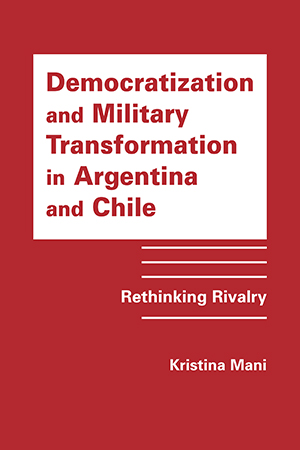
- 2011/248 pages
- A FirstForumPress Book
Democratization and Military Transformation in Argentina and Chile:
Rethinking Rivalry
Hardcover: $75.00
ISBN: 978-1-935049-40-1
Ebook: $75.00
ISBN: 978-1-62637-131-6
Is there a relationship between the consolidation of democracy and the ending of rivalries with neighboring states? Can internationalist foreign policies be useful in "reprogramming" militaries to accept civilian authority? Addressing these questions, Kristina Mani examines the dynamic connection between democracy building and security cooperation in Argentina and Chile in the 1990s. Her thoughtful analysis reveals how the international relations of democratizing states are both the product of domestic political goals and a potentially powerful shaper of domestic politics.







